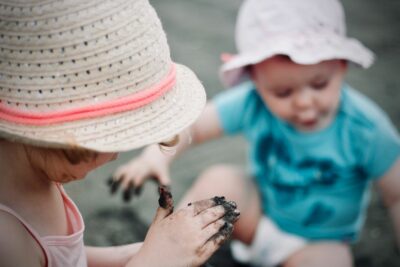
On corporal punishment: In the game of peek-a-boo, he replays in safe circumstances the alternate terror and delight, confirming his sense of self by risking and regaining complete consciousness. A light cloth spread over his face and body will elicit an immediate and forceful reaction. Short, sharp intakes of breath, and vigorous thrashing of arms and legs removes the erstwhile shroud to reveal widely staring eyes that scan the scene with frantic alertness until they lock glances with the smiling mother, whereupon he will wriggle and laugh with joy. . . . his aliveness additionally confirmed by the glad greeting implicit in the eye-to-eye oneness with another human. (Maurer 1966, p. 36)
Maurer, Adah. “Maturation of Concepts of Death.” British Journal of Medicine and Psychology 39 (1996):35–41.
Way back when…
I attended the sixth National Conference to Abolish Corporal Punishment in Schools in Nashville, Tennessee, during November 1993. I met Dr. Adah Maurer. She was a gem and quite the influencer at 88 years of age. She became one of my influencers because her method of advocacy resonated. She spoke and published on the topics near and dear to her. Top of the list was the ban of corporal punishment in schools. And while she spoke and wrote about the shadow side of human nature, she was a delight to meet and talk with. It’s why I listed her as one of my influencers in my book, Essential Soul Care: Designing an Expansive Life.
Her scholarly advocacy was quite in depth and spanned her entire career. What follows are just a few of articles that capture the essence of her passion for the abolition of corporal punishment.
Adah Maurer Tribute 1905-1998
A Remembrance by Jordan Riak, March 1998
The Influence of Corporal Punishment on Crime
by Adah Maurer, Ph.D. and James S. Wallerstein
The Medical Effects of Physical Punishment (Part 1 of 6)
by Adah Maurer, Ph.D.
Synchronicity Note
As this blog post was being written, I looked up the date of the conference I attended in Nashville. The 1994 conference was not the first listing. In fact, it was a news article dated this day, 1/25/24 about a bill being introduced in TN to ban corporal punishment in schools. That’s 30 years later. Dr. Maurer fought the good fight.
Ten Reasons Not to Hit Your Kids
Just say NO to corporal punishment please. I have used this information for over 10 years helping parents modify aggressive parenting styles that include spanking and corporal punishment. In the years that I have been in the mental health field this has by far been the most controversial topic I have presented- whether to friends, family, colleagues or clients. I wonder if the pendulum has begun to shift at all? I offer my most favorite article on the topic here: (excerpted from Ten Reasons Not to Hit Your Kids by Jan Hunt, M.Sc.)
- Hitting children teaches them to become hitters themselves. Extensive research data is now available to support a direct correlation between corporal punishment in childhood and aggressive or violent behavior in the teenage and adult years. Virtually all of the most dangerous criminals were regularly threatened and punished in childhood. It is nature’s plan that children learn attitudes and behaviors through observation and imitation of their parents’ actions, for good or ill. Thus it is the responsibility of parents to set an example of empathy and wisdom.
- In many cases of so-called “bad behavior”, the child is simply responding in the only way he can, given his age and experience, to neglect of basic needs. Among these needs are: proper sleep and nutrition, treatment of hidden allergy, fresh air, exercise, and sufficient freedom to explore the world around him. But his greatest need is for his parents’ undivided attention. In these busy times, few children receive sufficient time and attention from their parents, who are often too distracted by their own problems and worries to treat their children with patience and empathy. It is surely wrong and unfair to punish a child for responding in a natural way to having important needs neglected. For this reason, punishment is not only ineffective in the long run, it is also clearly unjust.
- Punishment distracts the child from learning how to resolve conflict in an effective and humane way. As the educator John Holt wrote, “When we make a child afraid, we stop learning dead in its tracks.” A punished child becomes preoccupied with feelings of anger and fantasies of revenge, and is thus deprived of the opportunity to learn more effective methods of solving the problem at hand. Thus, a punished child learns little about how to handle or prevent similar situations in the future.
- Punishment interferes with the bond between parent and child, as it is not human nature to feel loving toward someone who hurts us. The true spirit of cooperation which every parent desires can arise only through a strong bond based on mutual feelings of love and respect. Punishment, even when it appears to work, can produce only superficially good behavior based on fear, which can only take place until the child is old enough to resist. In contrast, cooperation based on respect will last permanently, bringing many years of mutual happiness as the child and parent grow older.
- Many parents never learned in their own childhood that there are positive ways of relating to children. When punishment does not accomplish the desired goals, and if the parent is unaware of alternative methods, punishment can escalate to more frequent and dangerous actions against the child.
- Anger and frustration which cannot be safely expressed by a child become stored inside; angry teenagers do not fall from the sky. Anger that has been accumulating for many years can come as a shock to parents whose child now feels strong enough to express this rage. Punishment may appear to produce “good behavior” in the early years, but always at a high price, paid by parents and by society as a whole, as the child enters adolescence and early adulthood.
- Spanking on the buttocks, an erogenous zone in childhood, can create in the child’s mind an association between pain and sexual pleasure, and lead to difficulties in adulthood. “Spanking wanted” ads in alternative newspapers attest to the sad consequences of this confusion of pain and pleasure. If a child receives little parental attention except when being punished, this will further merge the concepts of pain and pleasure in the child’s mind. A child in this situation will have little self-esteem, believing he deserves nothing better. For more on this topic, see “The Sexual Dangers of Spanking Children” (also in French).
- Even relatively moderate spanking can be physically dangerous. Blows to the lower end of the spinal column send shock waves along the length of the spine, and may injure the child. The prevalence of lower back pain among adults in our society may well have its origins in childhood punishment. Some children have become paralyzed through nerve damage from spanking, and some have died after mild paddlings, due to undiagnosed medical complications.
- Physical punishment gives the dangerous and unfair message that “might makes right”, that it is permissible to hurt someone else, provided they are smaller and less powerful than you are. The child then concludes that it is permissible to mistreat younger or smaller children. When he becomes an adult, he can feel little compassion for those less fortunate than he is, and fears those who are more powerful. This will hinder the establishment of meaningful relationships so essential to an emotionally fulfilling life.
- Because children learn through parental modeling, physical punishment gives the message that hitting is an appropriate way to express feelings and to solve problems. If a child does not observe a parent solving problems in a creative and humane way, it can be difficult for him to learn to do this himself. For this reason, unskilled parenting often continues into the next generation.
Some of the facts Jan Hunt points to:
“Of all tyrannies, a tyranny exercised for the good of its victims, may be the most oppressive. Those who torment us for our own good will torment us without end, for they do so with the approval of their own conscience.” – C.S. Lewis, 1952
In 24 countries around the world, it is illegal for a parent, teacher, or anyone else to spank a child, and 113 countries prohibit corporal punishment in schools.1 Yet in all of North America, physical punishment by a parent, as long as it is not severe, is still seen by many as necessary discipline, and condoned, or sadly, even encouraged.
For the past several years, many psychiatrists, sociological researchers, and parents have recommended that we seriously consider banning the physical punishment of children. The most important reason, according to Dr. Peter Newell, coordinator of the organization End Punishment of Children (EPOCH)2, is that “all people have the right to protection of their physical integrity, and children are people too.”3
What works?
Gentle instruction, supported by a strong foundation of love and respect, is the only truly effective way to bring about commendable behavior based on strong inner values, instead of superficially “good” behavior based only on fear.
1 Sweden, Finland, Denmark, Norway, Austria, Cyprus, Croatia, Latvia, Israel, Germany, Bulgaria, Iceland, Romania, Ukraine, Hungary, Greece, Netherlands, New Zealand, Portugal, Uruguay, Venezuela, Spain, Chile, and Costa Rica. (Source: Center for Effective Discipline)
2 EPOCH Worldwide, 77 Holloway Road, London N78JZ UK
3 Personal communication.
Additional articles
Spanking is counterproductive and dangerous
Spanking children slows cognitive development and increases risk of criminal behavior, expert says
2021 Research further confirms corporal punishment is harmful
Stress
Do you feel like stress is interfering with your ability to maintain positive discipline with your child? Parents need self-care too. Consider these additional relaxation tips:





